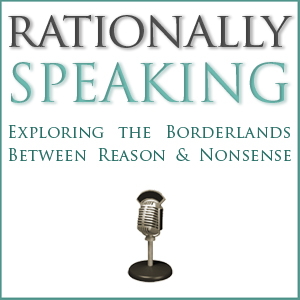Rationally Speaking #141 - Dan Sperber on "The Argumentative Theory of reason"
Rationally Speaking Podcast
New York City Skeptics
4.6 • 787 Ratings
🗓️ 23 August 2015
⏱️ 56 minutes
🧾️ Download transcript
Summary
The traditional story about reason is that it evolved to help humans see the world more clearly and (thereby) make better decisions. But on that view, some mysteries remain: why is the human brain so biased? Why are we so much better at defending our pre-existing views than at evaluating new ideas objectively?
In this episode of Rationally Speaking, Julia talks with guest Dan Sperber, professor of cognitive and social sciences, who is famous for advancing an alternate view of reason: that it evolved to help us argue with our fellow humans and convince them that we're right.
Dan Sperber is a social and cognitive scientist. His most influential work has been in the fields of cognitive anthropology and linguistic pragmatics. Sperber currently holds the positions of Directeur de Recherche émérite at the Centre National de la Recherche Scientifique and Director of the International Cognition and Culture Institute.
Transcript
Click on a timestamp to play from that location
| 0:00.0 | Rationally Speaking is a presentation of New York City skeptics dedicated to promoting critical thinking, skeptical inquiry, and science education. |
| 0:23.6 | For more information, please visit us at n.ycceptics.org. |
| 0:36.6 | Welcome to Rationally Speaking, the podcast where we explore the borderlands between reason and nonsense. |
| 0:43.3 | I'm your host, Julia Galef, and with me today is our guest, Professor Dan Sperber. |
| 0:49.2 | Dan is a French social and cognitive scientist who specializes in the fields of anthropology, |
| 0:55.7 | linguistics, philosophy, and psychology. Currently, he is a professor of philosophy and |
| 1:00.6 | cognitive science at the Central European University in Budapest. Dan, welcome to the show. |
| 1:05.8 | Thank you for having me. |
| 1:07.8 | So today what I want to talk about is there's a standard view about the human |
| 1:14.9 | capacity for reason, which is that it evolved in order to help humans figure out the truth |
| 1:21.7 | and make better decisions, which, you know, in theory, should produce better life outcomes and is therefore adaptive. |
| 1:30.1 | However, there are a bunch of puzzles surrounding this theory, |
| 1:35.0 | which cognitive scientists have increasingly noticed and documented over the decades, |
| 1:39.8 | in that our capacity for reasoning doesn't always go as it should. And so Dan Sperber, |
| 1:47.4 | along with his colleague Hugo Mercier, have developed an alternate theory about the human |
| 1:52.2 | capacity to reason called the argumentative theory of reasoning. So that's what we're going to |
| 1:57.4 | delve into today. Dan, would you like to kick things off by either just |
| 2:02.7 | stating your theory and then elaborating a bit or maybe giving some of the context for |
| 2:06.7 | what motivated the development of this theory? Well, yes, let me first point out that the idea |
| 2:13.9 | that human reasoning is for reaching better beliefs and better decisions |
| 2:24.3 | predates any idea about evolution. |
| 2:27.3 | So the notion of humans as a rational animal, |
... |
Please login to see the full transcript.
Disclaimer: The podcast and artwork embedded on this page are from New York City Skeptics, and are the property of its owner and not affiliated with or endorsed by Tapesearch.
Generated transcripts are the property of New York City Skeptics and are distributed freely under the Fair Use doctrine. Transcripts generated by Tapesearch are not guaranteed to be accurate.
Copyright © Tapesearch 2025.

